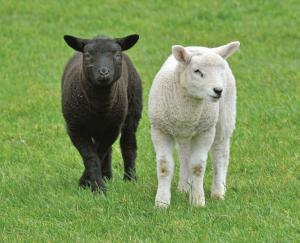As this year’s lambs graze and get fat with the sun on their backs it is hard to think of the cold, dark days of early spring 2020. However as the saying goes ‘to fail to prepare is to prepare to fail’ and preparation for the 2020 lambing season starts now before the rams are brought in.

Every year AFBI receives hundreds of ovine foetuses that have been born before their time. The two most commonly diagnosed infectious causes of ovine abortions are Toxoplasmosis and Enzootic Abortion of Ewes.
Toxoplasmosis
Toxoplasmosis is caused by infection of ewes during pregnancy by the microscopic parasite, Toxoplasma gondii. Susceptible sheep are infected by ingesting food or water contaminated with the parasite. The parasite is highly resistant and can survive for long periods (over 500 days) in moist, warm conditions.
The source of the contamination of feed and water are from recently infected cats which excrete millions of the parasites in the days following infection. Cats can become carriers of infection and can excrete smaller numbers of parasites at other times of unrelated illness. If a susceptible sheep becomes infected she will show no sign of infection. However, infection during early pregnancy can result in foetal death and abortion. Infection during mid pregnancy will present in a flock with the occurrence of stillborn or weak lambs, sometimes accompanied by a mummified foetus. Infection in late pregnancy will result in lambs being born normal but infected with the parasite and immune.
Over the last 6 years AFBI has detected Toxoplasmosis in 34% of ovine abortions due to an infectious agent. Whilst medicated feeds containing decoquinate are available to prevent losses due to toxoplasmosis they need to be given for a prolonged period of time and the dosage and feed consumption of the ewes needs to be carefully calculated to insure adequate dosing. Vaccination is available to prevent infection of the pregnant ewe. Vaccination has to be given at least four weeks prior to mating to be effective.
Enzootic Abortion of Ewes (EAE)
Enzootic Abortion of Ewes is caused by infection with the bacterium Chlamydia abortus. When an infected ewe aborts a large amount of the bacteria is shed in the placenta and uterine discharge for up to 10 days. Susceptible sheep are infected by ingesting this bacteria.
Pregnant ewes with more than 5 to 6 weeks to go before they lamb are at risk of aborting dead lambs or producing weak lambs. The ewe herself can occasionally become ill due to retention of the after birth. When the bacteria enters a flock, extensive losses in the region of 30% of pregnancies can occur following with yearly loss rates of 5% of pregnancies.
Over the last 6 years AFBI has detected EAE in 25% of ovine abortions due to an infectious agent, however in the spring of 2019 it was recorded as the cause of the abortion in 35% of those caused by an infectious agent. Whilst the antibiotic oxytetracycline is often used in the face of an outbreak to minimise losses, it does not control the disease in a flock, and cannot reverse heavy infections. It is also expensive and promotes overuse of antibiotics. Whole flock prophylactic antibiotics use is not appropriate for the control of EAE.
Vaccination is available to provide immunity and reduce shedding of the bacteria. Vaccination has to be given at least four weeks prior to mating to be effective.
Conclusion
Both of these infectious agents are zoonotic, i.e. they can cause disease in humans, particularly in pregnant women, and for this reason pregnant women are advised to avoid working with sheep during the lambing period. Discuss with your vet the risk and management of these diseases to your flock and consider vaccination now in good time before the rams are brought to the ewes to prevent losses next spring.
Notes to editors:
AFBI carries out high quality technology research and development, statutory, analytical, and diagnostic testing functions for DAERA and other Government departments, public bodies and commercial companies.
AFBI's Vision is “Advancing the Local and Global Agri-Food Sectors Through Scientific Excellence”.
AFBI's core areas:
- Leading improvements in the agri food industry;
- Protecting animal, plant and human health;
- Enhancing the natural and marine environment.
Latest news
- Resilience, Sustainability and Innovation survey 03 March 2025
- AFBI led Project Launched to Promote Sustainable Dairy Farming across the UK 18 February 2025
- UK Project Launched to Promote Sustainable Dairy Farming 11 February 2025
- International Day of Women and Girls in Science 11 February 2025
